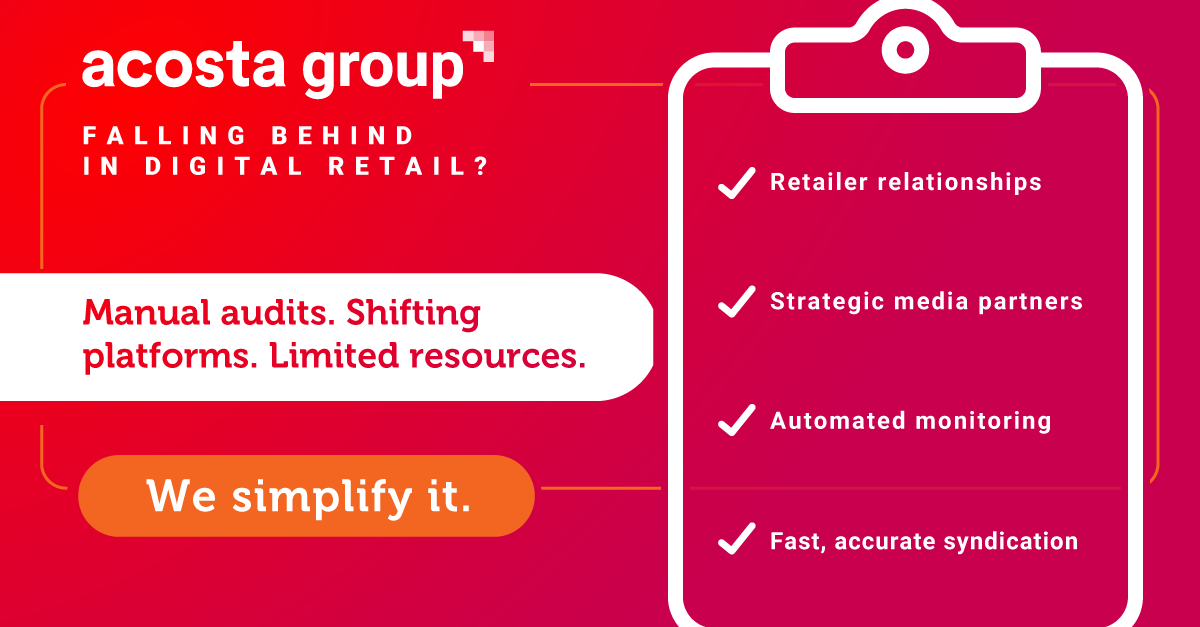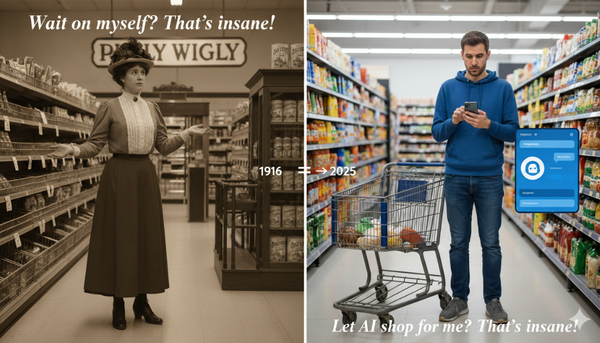Brian Monahan's 'Bloody Obvious' Bets Are Shaking Up Albertsons Media Collective
Brian Monahan doesn't dish out the usual sanitized, PR-approved talking points; he talks like someone who's built businesses and isn't afraid to say what everyone else is thinking.

A few weeks ago, I interviewed Brian Monahan for a profile in The Drum, just two months into his role as SVP of Albertsons Media Collective. I was delighted to speak with someone so unfiltered and entrepreneurial. You don't usually find that kind of energy at the top of a 175-million-customer grocery operation. But Brian didn't give me the usual sanitized, PR-approved talking points. He gave me the unfiltered take of someone who's built businesses and isn't afraid to say what everyone else is thinking.
And last week, I listened to his appearance on the Snarketing podcast, where he expanded on several themes from our conversation—and once again his energy and conviction delivered.
Here are some highlights from that podcast conversation, along with some key insights from my full profile piece (which you should definitely read for the complete story).
"Shame on Us" If This Is All We've Got
On the Snarketing podcast, Brian made a bold claim about where retail media actually stands:
"Retail media is the only media transaction where the objective of the buyer and the seller is the same. We're not trying to keep you on my website or on my platform with clickbait and rage inducing content—all the stuff that's created this information ecosystem that has all these unintended negative consequences. I am not playing that game. We have alignment for our set of advertisers and our shared customers. And if that alignment only means that we can do sponsored product ads and programmatic display, shame on us. There's so much more we can do. And I think we're just starting to scratch the surface of ways to drive collective growth."
He rattled off examples:
"Gamified scavenger hunts in the store with loyalty points as a currency to move people around the store. The way we do shoppable recipes or we take a shopping list and turn it into a map so it gets you in and around the store. When you place an e-commerce order with us, we call it drive up and go. We promise we'll bring you your order in five minutes or less. You drive up and you check in. There's like a five minute window there. We should do something with that. We should do something with a partner."
Newsflash: most retail media leaders aren't pitching gamified scavenger hunts in their first 60 days. But Brian isn't most leaders. That phrase—"bloody obvious"—shows up repeatedly in his career. It's the same instinct that led him to quit his big agency job in 1996 to launch Left Field with Amazon as a first client, and later to pitch Walmart's board on building a retail media network when most executives saw it as a distraction.
When your time, budget and team are already maxed out, keeping up with retailer platforms and media requirements can feel like a never-ending labyrinth. That’s why even the best brands bring in an execution partner.
Acosta Group makes retail media execution simpler. They stay ahead of every platform update, tech shift, and media spec. So your campaigns actually show up and perform—without draining your team.
The Do-or-Die Moment: Moving Beyond Trade Budgets
But Brian's vision comes with a strategic reality that most retailers are ignoring. Most retail media networks are still living off trade and shopper budgets—the safe money that brands allocate specifically to individual retail partnerships. The real money—the big bucks—are in national brand budgets.
As Brian admitted to the Snarketing hosts:
"Most of us are still just living off of our trade and shopper allocation, and we haven't really figured out how to meaningfully plug into the national brand building efforts that advertisers have. The national brand campaign is national, and they care about sales through every retailer, not just the 8% of grocery sales that I represent. We have to figure out how to work with agencies because agencies are the ones controlling those brand dollars, to plug into the media planning process."
This is the do-or-die moment for any retail media networks not named Amazon or Walmart. Brian's solution focuses on workflow integration: providing conversion data into clean rooms, building self-service interfaces, and potentially even piping into buyers' own tools to prove real growth, not just shifting share from one retailer to another. Albertson's isn't the only one trying to convince CMOs to shift real brand dollars, rather than staying stuck as trade budget redistribution machines.
Putting Money Where His Mouth Is
Here's how Brian's "bloody obvious" philosophy shows up in practice. This fall, Albertsons launched a "BOGO for retail media" program where advertisers who purchase an impression get a matched impression from Albertsons' enterprise marketing budget. Albertsons is putting its own enterprise media budget on the line to prove alignment with advertisers.
"It's risky because we're committing our own enterprise media to align to what our advertisers are asking us to do," he says. "But it just seems so bloody obvious that we should be working together."
Two months in, and Brian seems to just be warming up. If his track record is any guide—spotting "bloody obvious" bets that everyone else misses is going to be part of the gig.
Read my full profile of Brian Monahan in The Drum: "Brian Monahan's 'Bloody Obvious' Bets Are Shaking Up Albertsons Media Collective"






